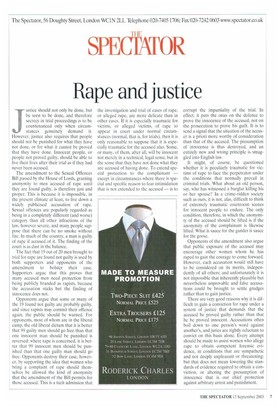Rape and justice
Justice should not only be done, but be seen to be done, and therefore secrecy in trial proceedings is to be countenanced only when circumstances genuinely demand it. However, justice also requires that people should not be punished for what they have not done, or for what it cannot be proved that they have done. Innocent people, or people not proved guilty, should be able to live their lives after their trial as if they had never been accused.
The amendment to the Sexual Offences Bill passed by the House of Lords, granting anonymity to men accused of rape until they are found guilty, is therefore just and proper. This is because it is impossible, in the present climate at least, to live down a widely publicised accusation of rape. Sexual offences are popularly regarded as being in a completely different (and worse) category than all other infractions of the law, however severe, and many people suppose that there can be no smoke without fire. In much of the country, a man is guilty of rape if accused of it. The finding of the court is as dust in the balance.
The fact that 1.9 out of 20 men brought to trial for rape are found not guilty is used by both supporters and opponents of the amendment to bolster their case. Supporters argue that this proves that many accused men need protection from being publicly branded as rapists, because the accusation sticks but the finding of innocence does not.
Opponents argue that some or many of the 19 found not guilty are probably guilty, and since rapists may commit their offence again, the public should be warned. For opponents, most of whom are in the liberal camp, the old liberal dictum that it is better that 99 guilty men should go free than that one innocent man should be punished is reversed: where rape is concerned, it is better that 99 innocent men should be punished than that one guilty man should go free, Opponents destroy their case, however, by supporting the idea that women who bring a complaint of rape should themselves be allowed the kind of anonymity that the amendment of the Bill permits for those accused. This is a tacit admission that the investigation and trial of cases of rape, or alleged rape, are more delicate than in other cases. If it is especially traumatic for victims, or alleged victims, of rape to appear in court under normal circumstances (normal, that is, for trials), then it is only reasonable to suppose that it is especially traumatic for the accused also. Some, or many, of them, after all, will be innocent not merely in a technical, legal sense, but in the sense that they have not done what they are accused of having done. To extend special protection to the complainant — except in circumstances where there is special and specific reason to fear intimidation that is not extended to the accused — is to corrupt the impartiality of the trial. In effect, it puts the onus on the defence to prove the innocence of the accused, not on the prosecution to prove his guilt. It is to send a signal that the situation of the accuser is a priori more worthy of consideration than that of the accused. The presumption of innocence is thus destroyed, and an entirely new and wrong principle is smuggled into English law.
It might, of course, be questioned whether it is peculiarly traumatic for victims of rape to face the perpetrator under the conditions that normally prevail in criminal trials. What about an old person, say, who has witnessed a burglar killing his or her spouse? In a crime-ridden society such as ours, it is not. alas, difficult to think of extremely traumatic courtroom scenes for innocent people to endure, The only condition, therefore, in which the anonymity of the accused should be lifted is if the anonymity of the complainant is likewise lifted. What is sauce for the gander is sauce for the goose.
Opponents of the amendment also argue that public exposure of the accused may encourage other women whom he has raped to gain the courage to come forward, However, each accusation would still have to be considered on its merits, independently of all others; and unfortunately it is not impassible that inherently plausible but nevertheless unprovable and false accusations could be brought to settle grudges rather than to gain justice.
There are very good reasons why it is difficult to gain a conviction for rape under a system of justice that demands that the accused be proved guilty rather than that he be proved innocent. Accusations often boil down to one person's word against another's, and juries are rightly reluctant to convict on this basis alone. Every attempt should be made to assist women who allege rape to obtain competent forensic evidence, in conditions that are sympathetic and not deeply unpleasant or threatening: but that does not mean lowering the standards of evidence required to obtain a conviction, or altering the presumption of innocence that is our chief protection against arbitrary arrest and punishment.


























































































 Previous page
Previous page